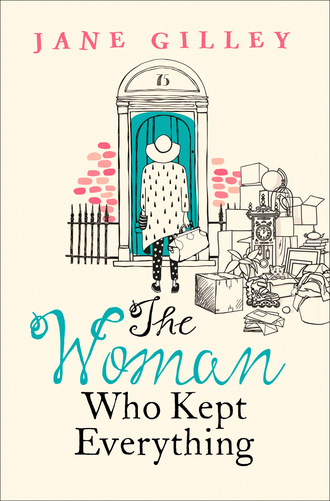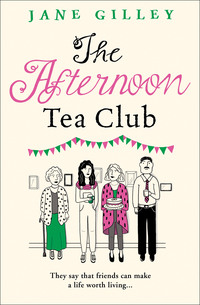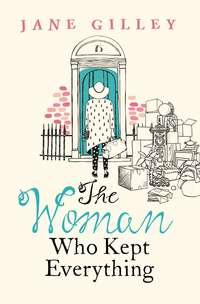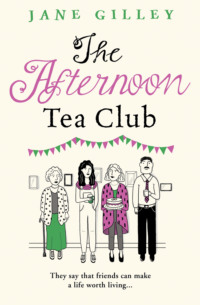
Полная версия
The Woman Who Kept Everything

THE WOMAN WHO KEPT EVERYTHING
JANE GILLEY

Published by AVON
A Division of HarperCollinsPublishers Ltd
1 London Bridge Street
London SE1 9GF
www.harpercollins.co.uk
First published in Great Britain by HarperCollinsPublishers 2018
Copyright © Jane Gilley 2018
Cover design © Becky Glibbery 2018
Cover illustrations © Shutterstock
Jane Gilley asserts the moral right to be identified as the author of this work.
A catalogue copy of this book is available from the British Library.
This novel is entirely a work of fiction. The names, characters and incidents portrayed in it are the work of the author’s imagination. Any resemblance to actual persons, living or dead, events or localities is entirely coincidental.
All rights reserved under International and Pan-American Copyright Conventions. By payment of the required fees, you have been granted the non-exclusive, non-transferable right to access and read the text of this ebook on screen. No part of this text may be reproduced, transmitted, downloaded, decompiled, reverse engineered, or stored in or introduced into any information storage and retrieval system, in any form or by any means, whether electronic or mechanical, now known or hereinafter invented, without the express written permission of HarperCollins.
Ebook Edition © December 2018; ISBN: 9780008308629
Version: 2019-12-04
Table of Contents
Cover
Title Page
Copyright
Chapter 1
Chapter 2
Chapter 3
Chapter 4
Chapter 5
Chapter 6
Chapter 7
Chapter 8
Chapter 9
Chapter 10
Chapter 11
Chapter 12
Chapter 13
Chapter 14
Chapter 15
Chapter 16
Chapter 17
Chapter 18
Chapter 19
Chapter 20
Chapter 21
Chapter 22
Chapter 23
Chapter 24
Chapter 25
Chapter 26
Chapter 27
Chapter 28
Chapter 29
Chapter 30
Chapter 31
Chapter 32
Chapter 33
Chapter 34
Chapter 35
Chapter 36
Chapter 37
Chapter 38
Chapter 39
Chapter 40
Chapter 41
Chapter 42
Chapter 43
Chapter 44
Chapter 45
Chapter 46
Chapter 47
Chapter 48
Chapter 49
Chapter 50
Chapter 51
Acknowledgments
Keep Reading...
About the Author
About the Publisher
Chapter 1
The boiling hot water splashed over Gloria’s fingers. ‘Waargh!’
She did a little agony dance whilst she waited for the pain to ease, blowing on her fingers. Damn. She’d need to get outside to dunk her hand in the cold water barrel.
Her oldest friend, Tilsbury, was always harping on about that darned pan; said that using it, without a lid, instead of a kettle, might prove disastrous one day. Gloria wouldn’t buy a kettle, though. Said she didn’t have the money for expensive items like that. Well, her son, Clegg, had given her a credit card for ‘essential items’ but she never went anywhere to use it. In fact, she rarely went out at all. She didn’t really need to.
Today she’d knocked the pan by accident, reaching over to check the potato soup she was cooking for their lunch. These days she was always eating potato soup, on account that she had a large sack of them, out back, that Tilsbury had got from someone in the know. She liked that it could be a cheap nourishing meal when she had onions, carrots and a good stock in it.
But, today, she only had potatoes. Add a bit of salt and it would have to do, she’d thought. Anyway, the hot water for their tea, boiling away in the pan next to the soup, had sploshed onto her left hand as she’d leaned over the grimy stove to stir their meal.
Gloria grunted as she hitched up her Crimplene dress and clambered over the piles of squashed cardboard boxes and magazines, nearly slipping on mouldy teabags, decomposing potato skins, marmalade-smeared crusts and other detritus around the kitchen sink unit. She no longer noticed the stink like rotting cabbage. Empty, dripping or congealed milk cartons, plastic bags and other household rubbish also littered the floor – more obstacles to tackle – in order to get to that cold water barrel, outside by the back door. The original Georgian taps in her kitchen sink had long since seized up. So the only water she could use was in that rainwater barrel, outdoors: for cooking, for occasional washing, for everything really.
But, at seventy-nine, she knew she was getting too old for all this.
Her fingers were blistered from similar events. A kettle would make things easier, of course. But it wasn’t just the money. She felt pretty much housebound now, more from lack of motivation and despondency than anything else. There wasn’t anything physically preventing her from doing things. She occasionally forgot things but she wasn’t an invalid and she didn’t need to use a walking stick yet, even though she was a bit wobbly on her feet sometimes. So she could go down to the shops if she wanted. She just didn’t want to, any more. Anyway, Tilsbury would pop by and get her the things she really needed, when she needed anything.
‘Go fetch us a tub of marge,’ she’d say to Tilsbury, when he came round to see what else she needed before he went to fetch her pension for her. ‘Bit of honey wouldn’t go amiss, either. And get me a bar of that Imperial Leather soap. I likes that, for a treat, I do.’
So Tilsbury, duly, got all the bits she needed from the corner shop and collected her pension as well. And her son, Clegg, got her teabags, carrots, eggs and bread, when he remembered to come see her. He hadn’t been to see her in a while, though. Three weeks four days, to be precise, Gloria noted, missing him. She crossed the white squares off on the calendar board attached to the back of the door – the calendar board Tilsbury had made and put up for her – in between her son’s sporadic visits. She counted the days until he reappeared at her door, hopefully with another bag of groceries or provisions in hand.
When her husband, Arthur, was alive it hadn’t been a problem. Clegg had even brought the rest of the family around to visit as well. Oh, it’d been lovely seeing little Jessie and Adam, her only grandchildren. But since Clegg had told her he’d got busier and busier at work he’d been coming to see her less and less. And she hadn’t seen the children or his wife, Val, in – what? Crikey, yes, at least ten years or more. Such a shame, such a real shame, Gloria thought sadly.
Once, though, Tilsbury had tried to cuff Clegg, after listening to Gloria moan for years about the way her son treated her. Tilsbury told Clegg he was a useless bastard for the way he allowed his mother to live in this dump of a place, rarely visiting. But Clegg was a bulky gruff of a man and had thumped Tilsbury instead. ‘Phaww. That stung a bit, it did, my love,’ he’d whimpered to Gloria, who’d merely shaken her head. So Tilsbury kept out of the way when Clegg visited now.
Gloria and Tilsbury went way back. From school, initially.
Oh, those were the days, Gloria often thought, even though there was such a lot of clearing up and rebuilding being done after the Second World War. But she remembered being quite shy as a youngster, probably because she was an only child and adopted. Her adoptive mum, Alice, was a kind but childless woman who made sure Gloria was loved and she doted on her as though she was her own blood. At primary school she’d only had two friends: Jocelyn and Mabel. And her favourite thing, she remembered, was playing in the school sandpit with them or seeing who could do the best handstand. They’d also gone to secondary school together and it was there they met Tilsbury, and his friends – a group of boys who were a year older than them.
Gloria clicked with him immediately because of his ease around girls and they started seeing each other. He’d walk her home from school or she’d drag Jocelyn along to watch him play footie at weekends. At one point, though, she nearly fell out with Jocelyn who also said she fancied him.
However, Tilsbury then went to India with his family for a good few years because his father was a rail track engineer. When they all came back he took up with Gloria again but couldn’t settle and didn’t seem to know what he wanted out of life. He decided to leave Norwich in his late teens to ‘find out what I want to do’, he said.
So Gloria had decided to forget about him and move on with her life. Mabel got married and had children, early on, to Gerard – a boy-next-door type – and Jocelyn and Gloria got jobs as secretaries and enjoyed themselves as single young women. Eventually Gloria got together with Arthur, a reliable and honourable young man who worked for a manufacturing company and was liked by everyone. She met him at a barn dance.
When Tilsbury returned to the area after his travels around the country he married Jocelyn, much to Gloria’s surprise. In those early days it did cause a bit of a rift between them all. Jocelyn hadn’t dared tell Gloria who she was going out with at first. ‘Well, you were with Arthur. And it just ’appened!’ she ruefully admitted to Gloria, later. But they’d been good friends and the rift healed, eventually, and they resumed a friendship of sorts. Besides Gloria had her life with Arthur and they had their young son, Clegg, and they were very happy.
And then many years later, Tilsbury started dropping by every few weeks, helping Gloria out with errands or a bit of DIY, when her husband Arthur died, in the Nineties. But it tickled Gloria to think that Tilsbury had always been sweet on her.
‘Just keeping an eye out for you, old girl,’ he’d say.
‘I’m middle-aged, you oaf, not ancient yet! Besides I don’t need you always fussing round me,’ she’d told him, huffily. ‘Go fuss round your own family.’
What family?
His estranged wife Jocelyn had shooed him out of their cramped council house, years earlier, after he’d tripped over another one of her flippin’ rescue cats. She swore he’d kicked it. He hadn’t! He’d said the house felt overcrowded – not because they’d ever had kids but because there’d been a constant flow of ruddy cats in the place, nineteen at last count. Some had bits missing from their ears; one had no ears. Some were flea-ridden; some pregnant or scrawny. And there was fur and faeces trays everywhere. Meow, meow, meow, all day long, and then howling at night. It annoyed the neighbours; it drove him crazy. It was a bloody madhouse. Anyway, Jocelyn – in no uncertain terms – told him to leave but he knew he was best off out of it.
‘I’m gone,’ were his last words as he left without a final nod to his wife.
So Tilsbury dossed in the park when it was warm enough and bagged a bed wherever he could the rest of the time – mainly at the shelter, occasionally at his sister’s or with friends. His life remained like that for quite a while. No responsibility for anyone or anything was how he decided he liked it best.
However, Tilsbury was thoroughly annoyed when Jocelyn moved on – and with his brother, Marvin, to boot! Previously they’d all been good friends, in the same clique. Miffed, Tilsbury had, on occasion, slipped into their house, when he knew they were safely down the dogs and nicked a bit of their rent money or topped up his hip flask with their vodka. He justified it by thinking it was the very least they could do after the way they’d treated him. And it kept him going each month when funds and sympathy were tight.
Besides, he reasoned, why would they always leave their spare key in the same place? It was his old hiding spot and they knew he was still around.
And – oh, yes – they’d always gotten mad with him, if they caught him when they got back, especially if he was making a sandwich or having a cup of tea. But a ‘Piss off, bruv’ from Marvin usually sent him scampering.
But finally, after years of Tilsbury’s periodic comings and goings and helping her out at her own house, Gloria felt sorry for him and said he could stay at hers, on those occasions when he didn’t otherwise have anywhere else to go.
‘Right now, my dear. If you wants to kip here for the night, whenever you needs to, you can. But it won’t be first class at the Hilton, you understand, because you might just notice I’m not too fussy about me housekeepin’. Ha, ha. Now the downside is that the only bit of room I’ve got free is right here in the hall. If we shift these boxes a bit more towards the kitchen, you can squeeze in down there.’
So Tilsbury had rooted around upstairs and found a couple of blankets and plonked them on the floor over a wodge of newspapers. Reckoned it kept him warm enough, the nights he stayed – even in the winter – and so they got on like that.
Gloria often told Tilsbury she wished she’d got a house with ‘all mod cons’ like she’d seen on the telly – when she’d had a telly. Well, she still had a telly but she wasn’t quite sure where it was now. Least there wasn’t the darned licence to pay for any more.
Anyway, she knew her television was somewhere in the room that used to be a lounge. And it probably still was a lounge under all the masses of stuff in there. But there were masses of stuff everywhere, now. It rose up around her like huge towers, locking her in. It made her feel safe. But Gloria certainly knew – oh, she could see – that her house was a humongous mess. But she had neither the strength nor resolve to even begin the colossal task of sorting it all out now.
‘Too late for all that, dearie,’ she’d say when someone made a derogatory comment. ‘It has to stay in here, ducks! Where else can it all go?’
Chapter 2
Even though Gloria realised what a state her house was in, she’d felt very blessed and privileged that her real family had left her this house. What a bonus! Number 75 Briar Way handed to her on a plate, it was. And no siblings to share it with either; just Arthur, when he was alive. It had been fantastic being able to escape the constant struggle to find money, each month, for their council tenancy. Getting their own real, proper house was like a dream come true for them.
‘And one less chuffin’ worry,’ Arthur used to say.
She recalled how her real ma and pa had left her the house. Well, actually, her grandmother had left it to her. She’d gotten a letter from her grandmother’s solicitor, years ago, along with the deeds to her house. She and Arthur were living in a scantily furnished council house, with their young son, whilst they tried to save up for better things. The letter also explained why she’d been given up for adoption.
Hello my darling Gloria,
Let me introduce myself. I am your grandmother, Barbara, and the purpose of my letter today is to explain some things for you.
I’m leaving my house to you in my Will on my death. As well as my house – which would have fallen to your parents on my death, and then to yourself, anyway – I wish to explain why you were not brought up by myself, following the untimely deaths of your beloved parents. I have also enclosed a couple of photographs: one of myself at a party and one of your parents’ wedding, outside the church. That’s me to the right of your mother.
Anyway, when you were a baby, the bombs started dropping on Britain at the outbreak of World War II. Your father, Walter, was working in the mustard factory and your mother – my only daughter, Emily – was a domestic cleaner. They were living with me in my house, whilst they saved up for their own family home. But en route to a rare evening out with friends, they both died tragically, in a bombing raid in Norwich, in July of 1940.
A couple of earlier bombing sessions had struck buildings and there’d been no fatalities. But on that particular night there’d been no air raid warning, either, as there sometimes wasn’t, and a lot of other mustard factory workers lost their lives that night too.
However, it was very fortunate your mother and father had chosen to leave you at home with me, that evening. I managed the daily procedures quite well at first, despite the problems that regular bombing raids brought, as well as food shortages. I even managed to find you a wet nurse. But, unfortunately, I couldn’t cope with a tiny baby by myself on account of my arthritis, which has always been a problem for me. I also didn’t want to be evacuated, so I had to make the difficult decision to have you adopted by a sweet woman I knew, Alice McKensie, who lived outside the city. (As my arthritis has recently got much worse, this letter is being transcribed by someone else.)
However, I kept in touch with Alice, your adoptive mother, and told her you’d inherit my house, on my death, when you were ready to take possession of it and as long as it wasn’t bombed during the war. She often let me know how you were doing and sent me photos.
So I truly hope you can forgive my giving you up and I hope that my gift of the house will help ease any financial burdens you might possibly have in the future. I sincerely hope you live a long and very happy existence, my darling.
Your ever-loving grandmother
Barbara xxxxx
‘Of course, I forgive you, dear grandmother,’ Gloria had whispered to the letter, as tears had flowed, unheeded, down her face. ‘It was war. It wasn’t ordinary circumstances. And at least I know my family history now.’
Her adopted mum, Alice, had always been a loving, encouraging person, so Gloria knew she hadn’t missed out by not having the chance to be brought up by her own parents. And she’d been thrilled with the life-changing gift of a house, which’d come at a time when Arthur had lost his job through a back injury and they had been struggling with their finances.
* * *
Gloria couldn’t actually remember when she’d started collecting things.
She’d always loved going to car boots for bargains. But after her beloved adopted mum died, Arthur had cleared out her council house – putting most of Alice’s things in their large shed out back. Gloria hadn’t wanted to get rid of Alice’s stuff. It made her feel like she still had her mother with her but it seemed to kick-start her collecting with a vengeance and she’d started bringing more and more stuff back from everywhere. Mainly from car boot sales but sometimes she found paraphernalia on roads outside people’s houses. They were a scruffy lot, she said, leaving three-legged chairs, old duvets or broken toys and other stuff just lying around, littering the streets.
But Arthur had gone wild about it.
‘Here, Glor, what’re you doing with all that stuff and all them house magazines? You don’t even like Changing Rooms.’
When Gloria had ignored his questioning, he’d tried a more gentle approach.
‘Yes but how much of this stuff do you really need and what do you need it for, my love?’
And when that hadn’t worked, he’d found himself close to tipping point.
‘Gloria, this’s got to stop! It’s in every room and I don’t want anything else in the lounge. Can’t see the telly! This place isn’t big enough for all this ruddy clobber.’
However Gloria had the ‘bug’ now and it was a very hard habit to break.
‘Never know when we might need some of it, though, Arth!’
Yet when Arthur got ill and his heart gave out to obesity, the hoarding just went on and on, increasing in intensity; increasing in the never-ending storing of items Gloria knew she had no intention of using or mending. But insisted she needed.
Due to the resistance she’d encountered because of the way she’d lived these past twenty years, Gloria knew folk didn’t understand why she needed to have lots of things around her. They didn’t know of her heartache when her adoptive mum died, nor how distraught she’d been when Arthur died. Distraught, especially when Arthur died because Clegg seemed to pull away from her after that. Perhaps it was the male influence he missed now Arthur was no longer here.
But it was as though, suddenly, there was no one around her who loved her and no one around her who she could love. No one was there with a friendly word or even those delicious little hugs from the grandchildren, when they’d been allowed to visit. And Arthur wasn’t there with that cup of tea he brought her, at the end of the day, and his: ‘Sleep tight, love, don’t let the bed bugs bite.’
So Gloria realised that having things around her made her feel safe when there was no one else around her to make her feel that way. It was almost as though she’d created walls to protect herself, she thought. Yet these walls were made from magazines or old boxes. Yes, that’s how she’d describe it. But even though Tilsbury had tried to make her see how alienated everyone else felt about what she was doing, she simply couldn’t bring herself to stop doing it.
The only room relatively free from junk was the bathroom now. It was always quite an arduous trip to get into the bathroom and even when she was there, the bath was stacked high with newspapers so she couldn’t use that any more. But at least she could wash in the sink, if she wanted, and use the loo. Or at least she could use them, after she’d stumbled over knick-knacks cluttering the stairs. And climbing over unruly piles of old clothing, including all Clegg’s baby clothes, which she’d kept in case she’d had more babies (unfortunately, it hadn’t happened) and heaps of towels and surplus carpet rolls, which she’d kept in case the carpet wore out.
Tilsbury said he didn’t mind the state of the place, though. Said it made the place warmer, cosier somehow.
‘Saves on washing and cleaning and all that crazy shite.’
But the following day there was a loud bang when Gloria turned one of the hob rings on and tried to heat the remaining potato soup from yesterday. The small kitchen was quickly filled with the nasty smell of something burning.




